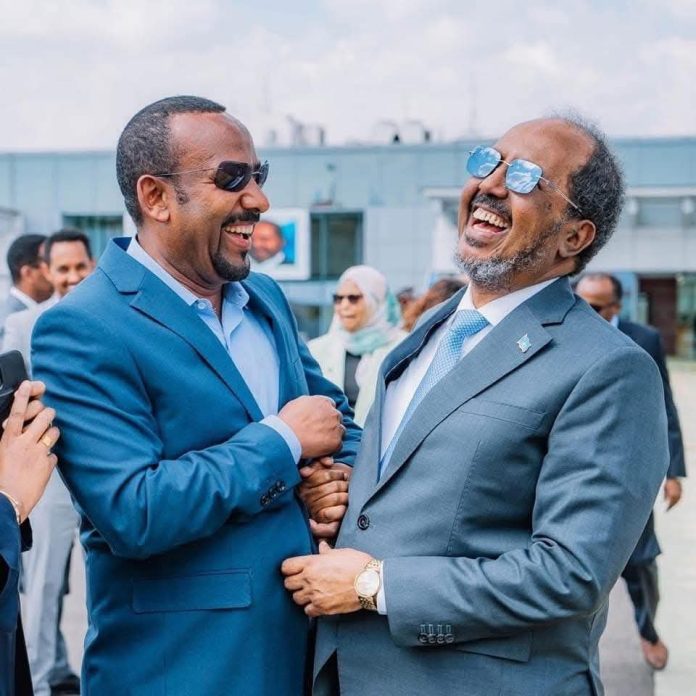Facebook Twitter (X) Instagram Somali Magazine - People's Magazine
Ethiopia and Somalia have officially restored full diplomatic relations, ending a year-long dispute sparked by Addis Ababa’s pursuit of sea access from Somaliland. The African Union (AU) has commended this significant development, describing it as a vital milestone for regional stability in the Horn of Africa.
The conflict, which strained ties between the neighboring countries, stemmed from Ethiopia’s efforts to negotiate maritime access through Somaliland, a breakaway region that Somalia firmly considers part of its sovereign territory. Somalia had opposed Ethiopia’s approach, arguing that it violated Somali sovereignty and risked further destabilizing the region.
The recent diplomatic breakthrough came after Somali President Hassan Sheikh Mohamud visited Addis Ababa over the weekend for direct talks with Ethiopian Prime Minister Abiy Ahmed. The meeting followed months of mediation, with Turkey playing a key role in facilitating dialogue between the two nations.
In December 2024, both leaders publicly committed to resolving their differences and negotiating a potential agreement that would grant landlocked Ethiopia controlled sea access while respecting Somalia’s territorial integrity. This renewed cooperation signals a turning point for regional diplomacy, as tensions between the countries had previously raised concerns of broader instability.
The African Union, headquartered in Addis Ababa, played a delicate role throughout the crisis. While refraining from directly criticizing Ethiopia, its host nation, the AU faced mounting pressure from Somalia to intervene. Following the successful reconciliation, the AU praised both nations for their commitment to dialogue and peaceful conflict resolution.
A key component of the restored relations involves Ethiopia’s continued participation in the African Union peacekeeping mission in Somalia. Ethiopian troops have long been stationed in Somalia to assist in counterterrorism efforts against extremist groups like Al-Shabaab. However, during the diplomatic standoff, Somalia had threatened to replace Ethiopian forces with Egyptian troops, raising additional geopolitical tensions in the region.
Egypt’s involvement had sparked concerns in Ethiopia due to the ongoing dispute between Cairo and Addis Ababa over the Grand Ethiopian Renaissance Dam (GERD) on the Nile River. Ethiopia viewed the potential deployment of Egyptian troops near its border as a threat to its national security, further complicating the Horn of Africa’s fragile stability.
With the restoration of ties, Ethiopia will maintain its peacekeeping role in Somalia, a critical step for regional security. Both nations have expressed a renewed commitment to counterterrorism cooperation, with a focus on defeating extremist threats and ensuring long-term peace in the Horn of Africa.
The maritime dispute that triggered the rift remains a complex issue. Somaliland, a self-declared autonomous region, has long sought international recognition as an independent state, a claim Somalia continues to reject. Ethiopia’s interest in securing sea access through Somaliland without Somalia’s direct approval had previously fueled the diplomatic crisis.
However, the latest agreements suggest a more collaborative approach, with both sides emphasizing mutual respect for sovereignty while seeking practical solutions for Ethiopia’s maritime access challenges.
The reconciliation between Ethiopia and Somalia is expected to have broader implications for regional stability and economic cooperation. Both nations have significant roles in the African Union and are key players in the Horn of Africa’s security architecture. By resolving their differences, they pave the way for greater collaboration on trade, infrastructure development, and cross-border investment.
The AU has called on both countries to continue engaging in diplomatic dialogue and to build on the progress made. The regional body also emphasized the importance of unity among African nations in addressing shared challenges, including border disputes, terrorism, and economic development.
The recent thaw in relations between Ethiopia and Somalia sets a positive precedent for other African conflicts, showcasing the power of direct dialogue and regional mediation in conflict resolution. As both nations work towards formalizing their agreements, the Horn of Africa could experience a new chapter of cooperation and stability.

